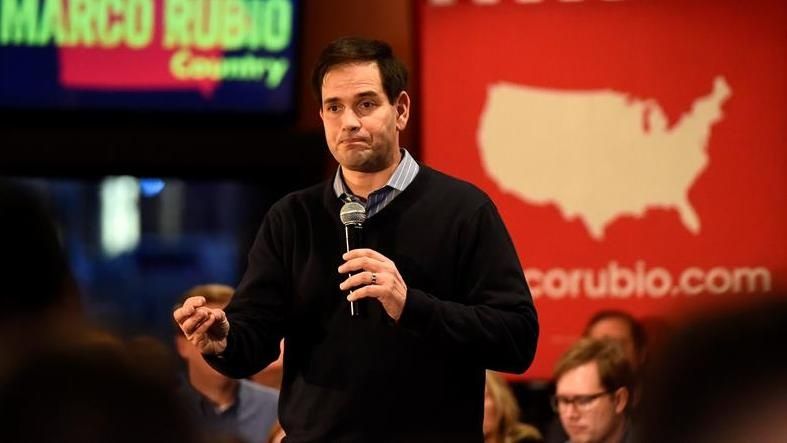The Latino population inside the United States is a constituency that is generally seen as one belonging to the Democratic Party.
![Will Shifts in the Next Generation of Latino Voters End Hardline Republican Foreign Policy towards Latin America?] Will Shifts in the Next Generation of Latino Voters End Hardline Republican Foreign Policy towards Latin America?](/__export/1454117028487/sites/telesur/img/news/2016/01/29/republican_crop1454117010638.jpg_916636689.jpg)
In many ways, that party has taken Latinos for granted, something reflected in President Obama's handling of the Central American migrant crisis and his tepid approach toward immigration reform. U.S. foreign policy toward Latin America under Obama also varied little from his Republican predecessor.
Early in his first term Obama promised a new approach, but his administration would go on to tacitly support coups against democratically elected governments in the region and declared Venezuela a threat to U.S. national security.
However, the attitude and questionable foreign policy of the Democratic Party toward Latin America and Latinos pales in comparison to that of the Republican Party.
If Democrats are still guided by a Cold War mentality when dealing with the region, Republicans are stuck in an imperialist mindset, viewing the region as the backyard of the United States.
This can be partly explained by the presence of radical and extremist Latinos inside the Republican Party who have shaped the party's foreign policy for Latin America.
Here are three Republican Latinos who have made their party an anathema for anyone who supports the progressive governments of Latin America. But is their influence starting to wane?
Ileana Ros-Lehtinen

Representative Ileana Ros-Lehtinen of Florida, elected in 1989, was the first Latina in the U.S. Congress. However, rather than taking up the mantle of champion of causes important to Latinos and Latinas in the United States, Ros-Lehtinen chose to make her name as a fierce opponent of the Cuban Revolution and leftist governments throughout the region.
Ros-Lehtinen is easily the loudest critic of the Cuban government and has said she would do everything in her power to keep the illegal U.S. blockade on Cuba.
The Cuban government has repeatedly stated that full normalization of relations between their country and the United States is contingent on the lifting on the blockade.
Driven by contempt for the Cuban Revolution, Ros-Lehtinen is seemingly uninterested in moving U.S. foreign policy out of the 20th century.
Her anti-Castro zeal was so strong that she became a vocal supporter of Orlando Bosch, describing him as “a freedom fighter for Cuba.”
Bosch was a CIA operative suspected of involvement in major terrorist incidents, such as the bombing of Cubana de Aviacion flight 455 that killed 73 people. This kind of support was par for the course for Ros-Lehtinen, who also backed the brutal post-coup regime of Roberto Micheletti in Honduras.
Not content with attacking Cuba, Ros-Lehtinen has also attacked Venezuela, co-authoring the Venezuela Defense of Human Rights and Civil Society Act that placed sanctions on Venezuela on spurious grounds.
Marco Rubio

As of late, attacking the Venezuelan government has become the cause célèbre of Republican lawmakers, chief among them Marco Rubio.
Rubio, who is currently seeking the Republican nomination for the 2016 presidential race, is currently the chair of the Senate Subcommittee on the Western Hemisphere, meaning his attitudes toward Latin America have real implications.
In fact, Rubio, the junior senator from Florida, chose to launch his campaign for president by attacking governments throughout Latin America.
He is close with the notorious far-right former Colombian President Alvaro Uribe. Rubio has delivered speeches on the Senate floor attacking Venezuela, calling President Nicolas Maduro a “clown” and alleging that elections are “manipulated” saying it is a “democracy in name only.”
Of course, the opposition in Venezuela won parliamentary elections in December 2015, a result that President Maduro recognized immediately.
Rubio's efforts at interfering in the internal affairs of Latin American countries has not gone unnoticed by regional leaders. Rubio, along with Ros-Lehtinen, were banned by Nicaraguan President Daniel Ortega from entering his country.
Both are also banned from Venezuela.
Ted Cruz

The Atlanic magazine referred to Ted Cruz as the “most hated man in Washington” but despite his unpopularity, his presidential aspirations mean, like Rubio, his opinions matter.
Cruz is also of Cuban descent but unlike Ros-Lehtinen, his family backed the Cuban Revolution. In fact, his father allegedly was a member of Fidel Castro's July 26 Movement, though his support has been disputed.
Despite that legacy, Cruz, like his Republican contemporaries, opposes the Obama administration's effort at improving relations with Cuba.
More worrisome however was Cruz's support for violent right-wing protests in Venezuela in 2014 that aimed to topple the democratically elected government.
“President Nicolas Maduro is taking a page out of the Castro playbook to violently oppress Venezuelans who are demanding an end to his disastrous rule," said Cruz in February 2014, at the height of the protests.
Cruz seemed to take no issue with what was for all intents and purposes a coup attempt led by the right-wing opposition.
His choice of words helps promote a false narrative about the 2014 protests and he wasn't afraid to play loose with the facts, saying that "activists (had) been detained and abused, and even shot dead in the streets."
There certainly was bloodshed during the protests that ultimately left 43 dead. However the majority of the violence came not from state security forces but the protesters who violently enforced street blockades in major cities throughout Venezuela.
Are Shifting Sands Eroding the Conservative Latino Vote?
These Republicans have one more thing in common beyond defending extremist views, their political base lies in the type of political view dominant in south Florida.
Many of those who left Cuba after the Fidel's revolution relocated to south Florida and went on to form the core of the conservative anti-communist political base that gave rise to personalities such as Ileana Ros-Lehtinen and Marco Rubio, both of which represent the state of Florida in the U.S. Congress. Although Ted Cruz represents Texas, he is very much cut from the same cloth.
The Cuban Revolution triumphed nearly 60 years ago now, this conservative base is growing old and is being replaced by a younger generation.
The kind of politician nurtured by the south Florida Latino base may be a dying breed as the next generation of Latinos grows in their political consciousness. Their priorities are not the same as their parents.
As a whole the importance of the Latino community continues to grow. The Republican's candidate in 2012 failed to win much support from Latinos, garnering only 27 percent of the Latino vote.
Latinos are not a homogeneous bloc of course, but perhaps it is time that the Republican party shed its extremist views.
Yet with Donald Trump, and his racist anti-Latino rhetoric, consistently leading polls in the Republican primary, that seems unlikely.
